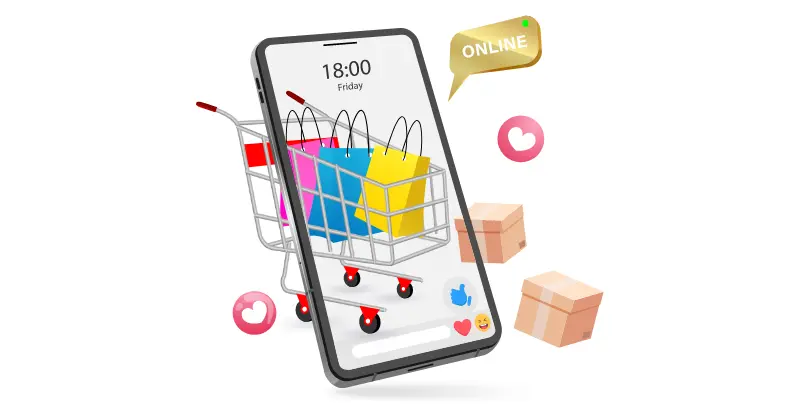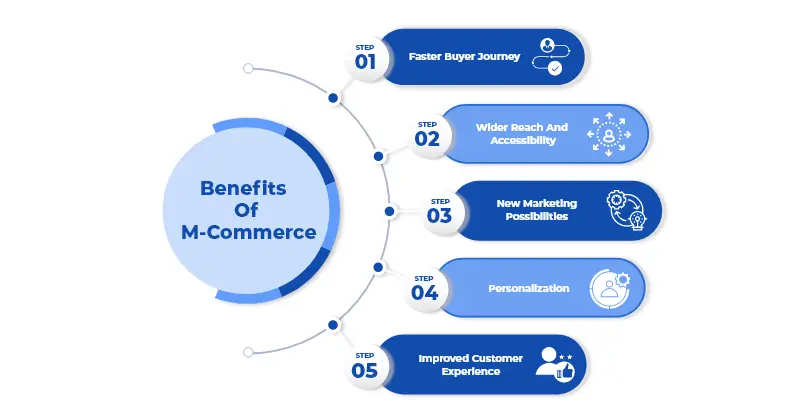Introduction
Currently, at least 6.3 billion people globally own a smartphone, and it is not an unfamiliar reality that most of us are engrossed in our smartphones 24/7.
From the moment we wake up till bedtime, we use our smartphones to scroll through numerous social media platforms or complete daily tasks like paying bills, checking the weather, getting driving directions, and alike. The list of how we use our cell phone to complete different tasks is endless!
But as of recent years, mobile devices have become the most prominent medium for online shopping. That’s where M-Commerce steps in the picture!
What is M-Commerce?

M-Commerce is a term coined by Kevin Duffey in 1997. It stands for mobile commerce, a concept similar to eCommerce and has been the rising star in the past decade.
Mobile commerce or M-Commerce is any transaction that takes place on a mobile device - be it a smartphone, tablet, or even a wearable device. It allows customers to purchase products or services online, with the comfort of being anywhere and anytime, thanks to their mobile devices.
Thanks to the latest technology of smartphones and the internet, consumers do not need cash or even debit/credit cards when trading online.
M-Commerce is a powerful customer trend that compelled the rise of new industries and services such as mobile banking, mobile tickets and boarding passes, worldly-wise location-based services, and mobile marketing.
According to a recent study, people check their phones an average of 49 times a day, suggesting how people are devoted to their phones
This is how huge the impact mobile and wireless technology has on consumers! It gives the customers the freedom to avail themselves of online shopping anytime and from anywhere.
M-Commerce also allows universal access to required information irrespective of time and place. These context-sensitive and location-based services include online purchases, promotion, mobile advertising, relationship-building activities and customer support. Retailers can now custom-make the interactions between the consumer and their smartphones, thereby increasing the opportunity for individual marketing.
It is no surprise that very soon, M-Commerce will have a consequential effect on almost every industry in the market. Smartphones have given us the liberty to do anything from anywhere.
Let us look at some interesting stats
Research performed by Statista.com predicts that by 2025, more than 10 per cent of all retail sales in the United States is expected to be generated via mobile commerce. This figure would represent a growth of almost seven percentage points since 2018. M-commerce was forecast to account for nearly 6 per cent of all retail sales in 2021
Here are a few examples that indicate the mark of M-Commerce on different online retail sectors:
1. E-Commerce:
People usually browse online for better prices and discounts, allowing them to search for the best value of their item while being in store so they can decide from where to make their purchase.
2. Online Food Delivery:
Many restaurants now supply menus from various joints around your area that allows you to place an order of favourite food items. Consumers need not worry about location because the GPS filters out restaurants that deliver food.
3. Travel:
Online travel marketplaces have become one of the most lucrative concepts, where you can book your entire holiday - travel, hotel and car rentals. The options provided are reasonable, tours filtered according to your GPS location, and you can book them instantly without contacting a travel agent in the physical world.
4. Grocery Shopping:
A grocery delivery mobile application enables users to get their grocery supplies either from one single vendor or different merchants with a single click on the screen of their mobile phones. It allows you to locate products and compare their prices, create shopping lists, look for special offers, promotions, deals and make payments via online payment methods. The groceries are delivered to the doorstep within the same day.
What are some vital benefits that M-Commerce applications bring to businesses?

-
Faster buyer journey
Mobile apps are 1.5 times quicker when loading data and search results for the end-user. Thus, they allow customers to browse and purchase products faster on their phones.
This is a tremendous advantage to enterprises that want to provide their customers with the best possible experience and streamline the purchasing process as much as possible.
-
Wider reach and accessibility
M-Commerce allows companies to penetrate new markets like never before. Researchers predict that the number of people who own a smartphone will rise to 6.6 million.
Hence, every person with a mobile device is a conceivable customer, offering tremendous opportunities for generating and nurturing sales leads. An M-Commerce app entitles consumers to scan various offers anywhere and anytime, on the go.
-
New marketing possibilities
M-Commerce offers intrinsic scalability to businesses. By monitoring and analysing the traffic in your mobile app, you can boost your mobile app marketing when consumer inquisitiveness spikes.
M-commerce allows reaching your target audience directly with a mobile app, reducing your marketing campaign costs.
-
Personalization
Consumers respond positively to personalized content. Personalized content helps to expand the brand reach and increase engagement, ultimately driving customer loyalty and improving the conversion rate.
M-Commerce also allows businesses to gather data about user location, interests, shopping history, items viewed, and social media profiles, helping to deliver the right messages to your customers.
-
Improved customer experience
The shoppers no longer need a desktop computer to shop; instead, they need a mobile device - smartphone, iPad, tablet, or alike.
M-Commerce gives enhanced benefits like:
- ✔ Mobility: M-Commerce makes online shopping far more convenient.
- ✔ Reachability: With SMS push notifications, online retailers can reach an augmented range of consumers.
- ✔ Location-tracking: M-commerce apps can pinpoint user locations using GPS technology and Wi-Fi, helping provide more personalized and location-specific content.
